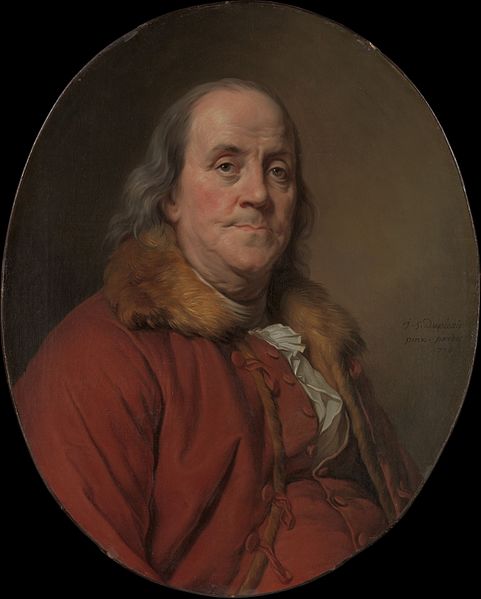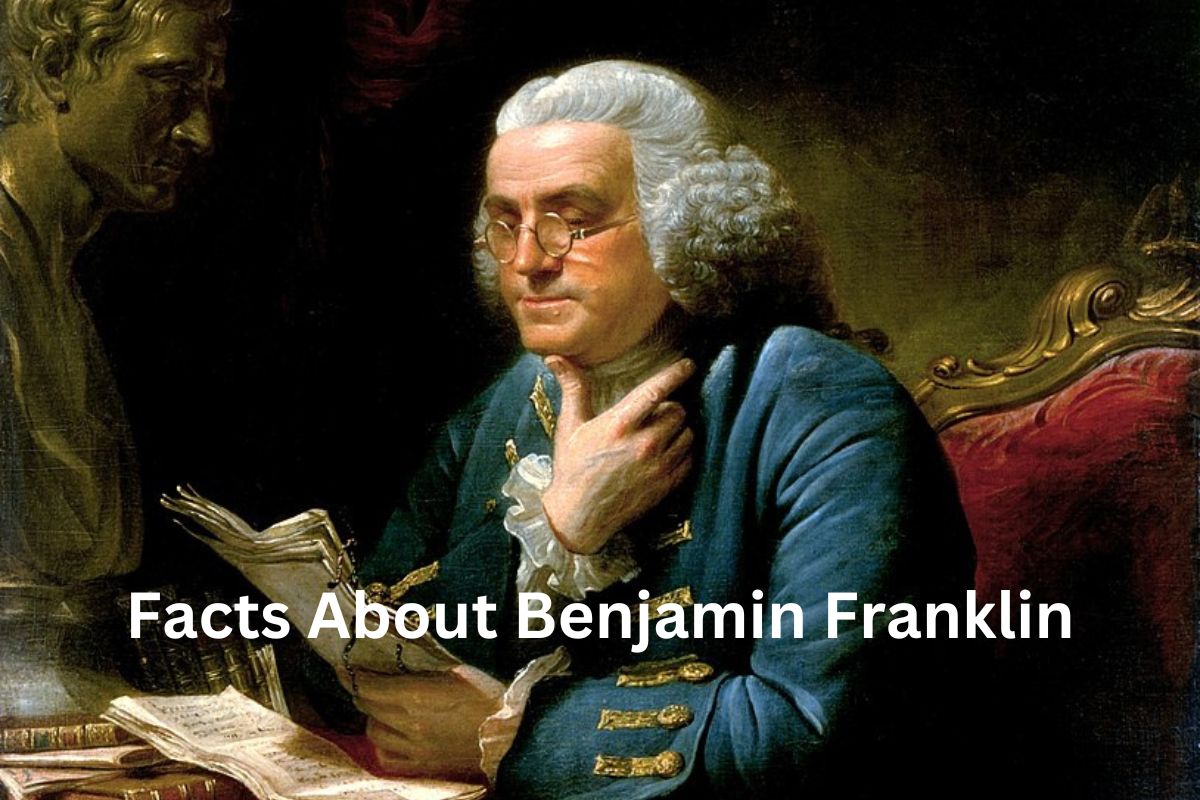Benjamin Franklin (1706-1790) was an American polymath, inventor, writer, and diplomat. He is known for his experiments with electricity, including the invention of the lightning rod.
Franklin played a crucial role in the American Revolution and served as a delegate to the Second Continental Congress.
He authored “Poor Richard’s Almanack” and founded the University of Pennsylvania.
Benjamin Franklin’s legacy as a statesman, inventor, writer, and philosopher remains influential. His dedication to learning, scientific exploration, and civic engagement continue to inspire generations, making him one of the most revered figures in American history.
Benjamin Franklin Facts
1. Benjamin Franklin was born on January 17, 1706, in Boston, Massachusetts
Benjamin Franklin was born on January 17, 1706, in Boston, Massachusetts. He was the fifteenth of seventeen children in his family. His father, Josiah Franklin, was a soap maker and candle maker, and his mother, Abiah Folger, came from a prominent New England family.
Also Read: Benjamin Franklin Accomplishments
Growing up in a large family, Franklin learned the importance of hard work, frugality, and self-improvement from an early age.

2. Franklin was a polymath, excelling in various fields such as science, writing, politics, and diplomacy
Franklin was a polymath, excelling in various fields such as science, writing, politics, and diplomacy. Despite having only two years of formal education, he was an avid reader and had a curious mind.
He developed a passion for writing at a young age and became a skilled writer and orator. His writings, including his autobiography, essays, and political pamphlets, showcased his wit, wisdom, and persuasive abilities.
3. Franklin is best known for his experiments with electricity
Franklin is best known for his experiments with electricity. In the mid-18th century, electricity was a topic of great interest and curiosity. Franklin’s most famous experiment took place in 1752 when he flew a kite with a metal key attached during a thunderstorm.
The purpose of the experiment was to prove that lightning was an electrical phenomenon. As the storm approached, the key on the kite attracted an electrical charge, and Franklin observed a spark when he touched the key with his knuckle.
Also Read: Benjamin Franklin Timeline
This groundbreaking experiment provided evidence that lightning and electricity were related, leading to the invention of the lightning rod, which helped protect buildings from lightning strikes. Franklin’s work on electricity laid the foundation for further scientific discoveries in the field.
4. He authored the famous publication “Poor Richard’s Almanack” under the pseudonym Richard Saunders
Franklin authored the famous publication “Poor Richard’s Almanack” under the pseudonym Richard Saunders. The almanac was first published in 1732 and continued to be published for 25 years. It contained a mix of weather forecasts, astronomical information, puzzles, and practical advice.
One of its key features was the inclusion of proverbs and aphorisms that imparted wisdom and common sense. The almanac became immensely popular, selling thousands of copies each year and solidifying Franklin’s reputation as a writer and philosopher.

5. Franklin was a prolific inventor and held patents for various inventions
Franklin was a prolific inventor and held patents for various inventions. His inquisitive mind and practical nature led him to develop numerous useful inventions. One of his most notable inventions was the lightning rod, which he created based on his experiments with electricity.
The lightning rod provided a means to protect buildings and structures from lightning strikes by providing a path for the electrical charge to safely dissipate into the ground.
Another significant invention was the bifocal glasses, which allowed individuals with both nearsightedness and farsightedness to see clearly by having two different lens strengths in one pair of glasses.
Franklin also invented the Franklin stove, an efficient heating device that provided more heat and used less fuel compared to conventional fireplaces.
6. He played a crucial role in the American Revolution and the drafting of the United States Constitution
Franklin played a crucial role in the American Revolution and the drafting of the United States Constitution. He served as a delegate to the Second Continental Congress, where he contributed to the discussions and debates that led to the adoption of the Declaration of Independence in 1776.
He was then appointed as the United States Minister to France, where he played a pivotal role in securing French support for the American cause during the Revolutionary War.
Franklin’s diplomatic skills and charm helped forge alliances and secure crucial military and financial aid from France, which greatly aided the American colonies in their struggle for independence.
After the war, Franklin participated in the Constitutional Convention of 1787, where he contributed to the drafting of the U.S. Constitution and advocated for a strong central government.

7. Franklin served as the United States Minister to France from 1776 to 1785
Franklin served as the United States Minister to France from 1776 to 1785. His time in France was marked by his charismatic personality, intellectual prowess, and diplomatic acumen.
Franklin’s reputation as a scientist and philosopher preceded him, and he was warmly received by the French, who were captivated by his wit and charm. His diplomatic efforts were instrumental in securing French support, including military assistance and financial loans, which played a significant role in the success of the American Revolution.
His popularity in France made him a beloved figure and a symbol of the American cause. His negotiations in Paris ultimately resulted in the signing of the Treaty of Paris in 1783, which formally ended the Revolutionary War and recognized the United States as an independent nation.
8. Franklin was an advocate for education and founded the University of Pennsylvania
Franklin was a strong advocate for education and founded the University of Pennsylvania, originally known as the Academy of Philadelphia.
In 1749, Franklin proposed the idea of establishing an educational institution that would focus on practical education and offer a broader curriculum than traditional colleges at the time.
The academy opened its doors in 1751, with Franklin serving as its first president. It later evolved into the University of Pennsylvania, becoming one of the leading universities in the United States.
Franklin’s emphasis on practical education and his vision of blending classical studies with vocational training had a lasting impact on the American education system.
9. Franklin was a strong proponent of freedom of the press
Franklin was a strong proponent of freedom of the press. Throughout his life, he published and contributed to various newspapers, including the Pennsylvania Gazette, which he owned for a time. He believed that a free press was vital for an informed citizenry and a functioning democracy.
Franklin used his newspapers as platforms for disseminating information, engaging in political discourse, and promoting intellectual and scientific pursuits. He recognized the power of the press in shaping public opinion and utilized it to advocate for causes such as freedom of speech and the right to dissent.
10. He was a lifelong learner and believed in self-improvement
Franklin was a lifelong learner and believed in self-improvement. He developed a personal development system called “The Art of Virtue.”
In this system, he identified thirteen virtues that he believed were essential for leading a virtuous and successful life, such as temperance, frugality, and humility. He devised a method to track his progress by focusing on one virtue per week and journaling his efforts and shortcomings.
Franklin’s commitment to self-improvement and his belief in the power of habit and discipline have inspired countless individuals to pursue personal growth and strive for moral excellence.
11. Franklin was a prominent abolitionist and became president of the Pennsylvania Society for Promoting the Abolition of Slavery
Franklin was a prominent abolitionist and became president of the Pennsylvania Society for Promoting the Abolition of Slavery in 1787.
While Benjamin Franklin owned slaves earlier in his life, his views on slavery evolved over time, and he became an advocate for emancipation. He spoke out against the institution of slavery and worked towards its abolition.
Franklin viewed slavery as contradictory to the principles of liberty and equality upon which the United States was founded. His involvement in the abolitionist movement contributed to the growing momentum towards ending slavery in the United States.
12. Franklin was a renowned diplomat and played a crucial role in negotiating the Treaty of Paris in 1783
Franklin was a renowned diplomat and played a crucial role in negotiating the Treaty of Paris in 1783. As the United States Minister to France, he skillfully navigated diplomatic channels and built relationships with influential French leaders.
Franklin’s reputation as a scientist, writer, and philosopher added to his credibility and appeal. He successfully secured critical support from France, including military assistance, financial aid, and diplomatic recognition.
His negotiations with British representatives resulted in the signing of the Treaty of Paris, which granted the United States independence and established its borders.
13. Franklin passed away on April 17, 1790, at the age of 84, in Philadelphia, Pennsylvania
Franklin passed away on April 17, 1790, at the age of 84 in Philadelphia, Pennsylvania. His death was mourned by people across the United States and Europe. Franklin’s legacy endures as one of the most influential figures in American history.
His contributions as a statesman, inventor, writer, and philosopher laid the foundation for the principles that shaped the United States. Franklin’s intellectual curiosity, pragmatism, and dedication to public service continue to inspire generations, and his impact on various fields, including science, literature, politics, and diplomacy, remains significant.
